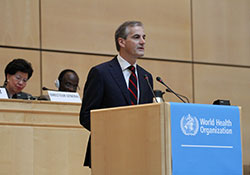World Health Assembly, day 2: resolution on noncommunicable diseases approved

WHO/Pierre Albouy
Continuing discussions from Monday, the World Health Assembly approved a resolution on strengthening policies on noncommunicable diseases to promote active ageing. It urges Member States to encourage older people’s active participation in society, increase healthy ageing and promote the highest standard of health and well-being for older people by addressing their needs.
Committee A approved resolution on the global burden of mental disorders and the need for a comprehensive, coordinated response from the health and social sectors in countries.
Health is crucial for development
Jonas Gahr Støre, Minister of Foreign Affairs of Norway and former WHO staff member, addressed a plenary session as an invited speaker. His speech underlined the need for sectors to work together, recognizing that expenditure on health is an investment, not a burden.
“Succeeding in local, national and global health ambitions requires mobilization of political will from across and above the silos of political decision-making. We need to remind presidents, prime ministers and finance ministers – and even foreign ministers – that they too are health ministers. We – your colleagues – need to fully appreciate that paying for health is much more than covering costs. It deals fundamentally with investment in human potential, in the strength of nations and communities, the performance of the economy and ultimately with investment in the security of states,” he stated.
Highlights from the European Region
- Zsuzsanna Jakab, WHO Regional Director for Europe, met Yohei Sasakawa, WHO Goodwill Ambassador and Chairman of The Nippon Foundation, to discuss leprosy. A few cases occur in some newly independent states (NIS) in the WHO European Region, and imported cases are found in European Union countries. Mr Sasakawa will visit the Russian Federation and Ukraine in June to raise awareness about the disease, and Ms Jakab offered her full support and will further discuss the need for support on leprosy in the Region.
- The Italian delegation met with the Regional Director to discuss an upcoming national meeting on 21 June with the theme “gaining health”. In addition, WHO would report on a recent visit to the island of Lampedusa, part of a project on migration and health, at the end of May. Further discussions will take place on the increasing focus on neglected tropical diseases.
- A meeting with the delegation from Cyprus focused on the country’s upcoming Presidency of the Council of the European Union, from 1 July 2012. The delegation announced that health priorities during the Presidency will complement those of Denmark, the current holder of the Presidency, and include: research (particularly on organ transplantation), cross-border health threats and healthy ageing.
- Kazakhstan’s delegation informed the Regional Director about recent work in primary care, and plans to organize a conference next year to mark the thirty-fifth anniversary of the Declaration of Alma-Ata on primary care.
- Discussions with the Dutch delegation focused on the health ministry’s support for the Health 2020 policy framework, and its related targets.
- The delegation from the United Kingdom discussed concerns about the health impact of austerity measures across Europe. The Regional Director explained that WHO could provide technical assistance to support European Union initiatives to address this.
- The Regional Director met with Manuel Ferreira Teixeira, State Secretary of Portugal, who confirmed that the sixty-third session of the WHO Regional Committee for Europe would take place in Portugal in September 2013, and that planning was underway.
- Delegates from Belgium, France, Iceland, Israel, Kazakhstan, Luxembourg, Monaco, Portugal, the Republic of Moldova, the Russian Federation, Spain, Sweden and Uzbekistan made statements in plenary.



